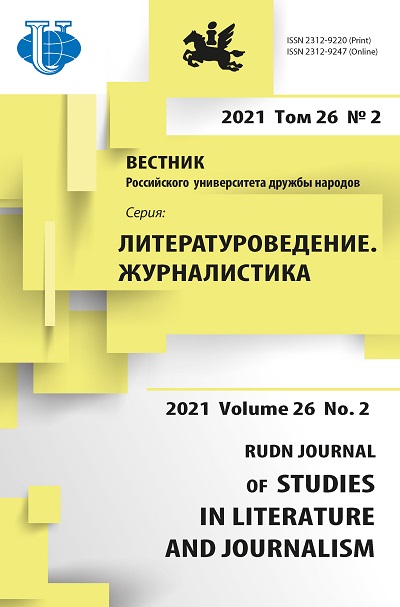The Depths of My Africa: Travelogues on the Land of Ancestors by Claude McKay and Langston Hughes
- Authors: Kuzina D.D.1
-
Affiliations:
- A.M. Gorky Institute of World Literature of the Russian Academy of Sciences
- Issue: Vol 26, No 2 (2021)
- Pages: 227-236
- Section: LITERARY CRITICISM
- URL: https://journals.rudn.ru/literary-criticism/article/view/26938
- DOI: https://doi.org/10.22363/2312-9220-2021-26-2-227-236
- ID: 26938
Cite item
Full Text
Abstract
The article is devoted to the image of Africa in the travelogues by poets Claude McKay (A Long Way From Home, 1937) and Langston Hughes (The Big Sea, 1940), the significant figures of Harlem Renaissance; and also compares this image with Africa in the poems of both writers. The image of Africa as “the land of ancestors” and “the foremother of the Negro people” was popular among the artists and philosophers of the Harlem Renaissance, but at the same time, it was often idealized. That is why meeting a real Africa becomes, to some extent, a moment of truth for an African-American artist, the reason to take a new look at himself and his values. Biographies of Hughes and McKay reveal why equally motivated, at first glance, writers united by a common dream of a “black people’s home”, when faced with the real Africa, react to it in exactly the opposite way. The article shows that young cosmopolitan poet Langston Hughes did not find respond to his poetic ideals in real Africa and after that forever divided Africa into real and poetic, while Claude McKay, who kept up the reunification of the Negro people and had traveled around the whole Europe, only in Africa for the first time in his life “went native”. At the same time, Hughes is significantly influenced by his mixed origins and McKay - by his colonial background. The article contains materials of correspondence, fragments of the travelogues never been translated into Russian before.
About the authors
Daria D. Kuzina
A.M. Gorky Institute of World Literature of the Russian Academy of Sciences
Author for correspondence.
Email: ketrivenia@gmail.com
Ph.D. student, junior researcher, Department of Literatures of Europe and America of Modern Times
25a Povarskaya St, Moscow, 121069, Russian FederationReferences
- Panova, O. (2019). Afro-American studies and the Harlem Renaissance: Literary theory as a provocation of literary history. Literature of the Americas (pp. 1–16). (In Russ.) Retrieved December 20, 2020, from http://litda.ru/index.php/ru/onlajn-publikatsii/176-2019-god-2
- Panova, O. (2019). An exotic guest: Claude McKay in USSR. Literature of the Americas, (6), 220–256. (In Russ.) https://doi.org/10.22455/2541-7894-2019-6-220-256
- Hughes, L. (2015). Selected letters (Arnold Rampersad & David Roussel, Eds.). New York.
- Hughes, L. (2010). Langston Hughes and the South African drum generation. The Correspondence (S. Graham & J. Walters, Eds.). Palgrave Macmillan, US.
- Gohar Saddik, M. (2008). The dialectics of homeland and identity: Reconstructing Africa in the poetry of Langston Hughes and Mohamed Al-Fayturi. Tydskrif vir Letterkunde, (45/1), 42–74.
- Berry, F. (1983). Langston Hughes before and beyond Harlem. Lawrence Hill and Company, Westport.
- Hughes, L. (1993). The big sea. New York.
- Ostrovskaya, E. (2017). Langston Hughes in Correspondence with The International Literature Magazine. Literature of the Americas, (3), 106–126. (In Russ.)
- Harris, T. (n.d.). The image of Africa in the literature of the Harlem Renaissance. National Humanities Center. Retrieved December 13, 2020, from http://nationalhumanitiescenter.org/tserve/freedom/1917beyond/essays/harlem.htm
- Tillery, T. (1992). Claude McKay: A black poet's struggle for identity. Massachusetts, University of Massachusetts Press.
- Ramish Kotti, S., & Nirupa Rani, K. (2006). Claude McKay: The literary identity from Jamaica to Harlem and beyond. Jefferson, McFarland and Company.
- McKay, C. (2007). A long way from home. New Brunswick, London, Rutgers University Press.
Supplementary files















